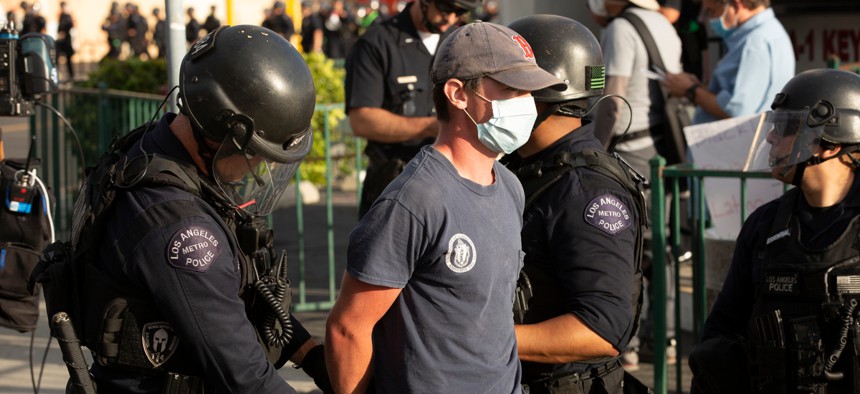Some Cities Decline to Prosecute Arrested Protesters

A protester is arrested in Los Angeles. Shutterstock

Connecting state and local government leaders
Prosecutors in large and small cities alike are saying they won’t press charges against peaceful protesters arrested for nonviolent offenses.
As protests continue across the United States over police brutality and the killing of George Floyd, many local prosecutors say that they won’t move forward with charges against protesters arrested for nonviolent offenses, such as curfew violations.
On Monday, the state attorney for Hillsborough County in Florida, which includes Tampa, announced that he would drop the charges brought against 67 people who were arrested for unlawful assembly at a protest on June 2 after he concluded that none of them engaged in violence.
“I’ve said many times that criminal justice reform involves looking at each case as a problem to solve, not just a person to be punished,” Hillsborough State Attorney Andrew Warren said at a press conference. “In these unlawful assembly cases, there is no value in filing charges. Prosecuting people for exercising their First Amendment rights creates problems rather than solving them. It can weaken the bonds between law enforcement and the community, while undermining faith in our system.”
The news of expungement was met with relief from protesters and community organizations involved with organizing the protests, who called it “a huge victory.” Demonstrators had been marching outside the Hillsborough County courthouse for nearly two weeks, in part calling for charges to be dropped.
Protesters in Hillsborough County are not alone. Warren’s sentiments mirror those of many prosecutors across the country who have decided not to press charges against peaceful protesters. Last week, the district attorneys in Manhattan, Brooklyn and the Bronx in New York City said that they would not prosecute those arrested on charges of unlawful assembly and disorderly conduct “in the interest of justice.”
A few days later, prosecutors announced similar decisions in several major cities in California, including San Diego, Santa Monica, Sacramento. In Los Angeles, where police arrested thousands of protesters after the city’s curfew went into effect, Los Angeles County District Attorney Jackie Lacey and Los Angeles City Attorney Mike Feuer also declined to prosecute those arrested for violating curfew or failing to disperse.
“I believe whole-heartedly in free speech and support the right of protesters to demonstrate peacefully against historic racial injustice in our criminal justice system and throughout our nation,” Lacey said in a statement. “I want to encourage the exchange of ideas and work to establish dialogue between law enforcement and protesters so that we may implement enduring systemic change.”
Attorneys with the National Lawyers Guild and the Los Angeles County Public Defenders Union say they want Lacey and Feuer to go a step further and destroy all arrest records. “Not just because arrestees are entitled to this relief by law, but because it would serve the interest of justice,” the attorneys said in a statement. “As we all know, arrest records can cause significant collateral consequences in the areas of housing, employment and immigration.”
The police response to the dropped charges has been mixed. In New York City, the decisions might have caused tensions with the city’s police department, as the agency pulled officers assigned to DA offices hours after the announcements about not prosecuting protesters. Police Commissioner Dermot Shea denied that decision was related, saying more officers were simply needed to help cover protests.
Tampa Police Chief Brian Dugan said in a statement that he supports people’s right to protest, but emphasized that those arrested by his officers had broken the law. “Although I understand the difficulty in prosecuting those arrested, they were given two warnings after blocking streets,” he said. “Although taking over intersections can be peaceful, it is still illegal.”
But in Los Angeles, Chief Michel Moore endorsed the decision to drop charges against those arrested for violating curfew or failing to disperse, calling it “productive and appropriate” and likely to create “lasting positive effects on our community.”
In other places, prosecutors say that they won’t do mass dismissals, but they won’t do mass prosecutions either. The Milwaukee city attorney said he will review each arrest for curfew violations on a case-by-case basis. If the charges are dismissed, protesters will be off the hook for the nearly $700 fine that would accompany a conviction. One county supervisor, who was tackled by a police officer before he was arrested and cited for a curfew violation, said that dismissing the charges is just the first step.
“That should not be the end of the fight,” Supervisor Ryan Clancy told local news station WTMJ. Clancy claimed that the Milwaukee Police Department was unnecessarily violent in their enforcement of the curfew and said he will be filing a lawsuit, something he is also encouraging other protesters to do. “The end goal here is not to have the ticket thrown out, it’s to make sure that we don’t have the misconduct … for the enforcement of that,” Clancy said.
Emma Coleman is the assistant editor for Route Fifty.

NEXT STORY: Health Experts Link Rise In Arizona Covid-19 Cases To End Of Stay-At-Home Order





